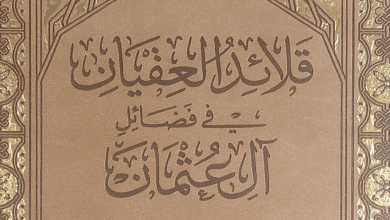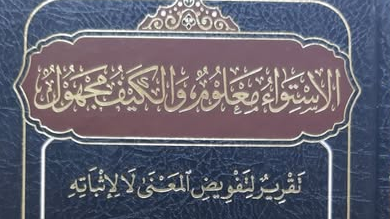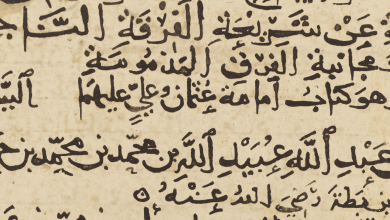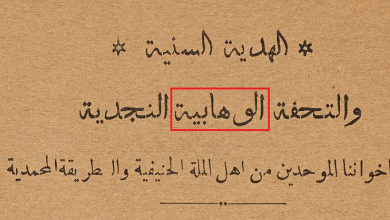AL-ḤĀFIẒ IBN ḤAJAR AL-HAYTAMĪ (d. 974 AH) ON WHAT IS OBLIGATORY TO LEARN AND BELIEVE REGARDING THE ṢIFĀT OF ALLĀH (DIVINE ATTRIBUTES) AND RELIGIOUS OBLIGATIONS
In his celebrated work al-Fatāwā al-Ḥadīthiyyah, al-Ḥāfiẓ Ibn Ḥajar al-Haytamī (d. 974H) addressed one of the most crucial questions facing every Muslim: What is individually obligatory (wājib ‘aynī) to learn and believe? His comprehensive response covers two major domains: beliefs regarding the divine attributes (Ṣifāt of Allāh) and practical religious obligations.
Of particular importance is his detailed exposition of the two main approaches – that of the Salaf (first three pious generations of Muslims) and Khalaf (the successors to the Salaf) – regarding ambiguous texts (mutashābihāt) concerning the divine attributes. While both approaches maintain Allāh’s transcendence (tanzīh), they differ in methodology: the Salaf mainly delegated (tafwīḍ) the precise meaning to Allāh, while some from the Khalaf interpret (ta’wīl) or make tafwīḍ of these texts in ways befitting divine perfection.
This fatwā represents a masterful synthesis of creedal and practical obligations, clarifying for the ordinary believer what they must know and practice in their religious life. The systematic treatment begins with beliefs about Allāh’s attributes, moves through core theological concepts, and concludes with practical worship obligations – providing an essential guidebook for religious knowledge and practice.
The Arabic text followed by the English translation:
Al-Fatāwā al-Ḥadīthiyyah (p. 61) by Imam Aḥmed Shihāb al-Dīn Ibn Ḥajar al-Haytamī al-Makkī:
وسئل أدام الله النفع بعلومه : ما الذي يجب علينا تعلمه ، واعتقاده ، بينوا لنا بياناً شافياً لا يحتاج معه إلى مراجعة مصنف ولكم الثواب الجزيل من الملك الجليل ؟
فأجاب بقوله : مما يجب على كل مكلف وجوباً عينياً لا رخصة في تركه ، أن يتعلم ظواهر الاعتقادات الواردة في الكتاب والسنة مع تنزيه الله تعالى عما هو محال عليه ، مما يقتضي جسماً أو جهة كالاستواء على العرش والآيات والأحاديث التي فيها ذكر الوجه واليد ، فهذه ونحوها فيها مذهبان مذهب السلف وهو الأسلم أن يفوض عِلْم حقائقها إلى الله تعالى من التنزيه عما دلت عليه ظواهرها مما هو مستحيل على الله ، ومذهب الخلف وهو أن يُخْرج تلك النصوص عن ظواهرها وتُحْمل على محامل تليق به تعالى كَحْمل الاستواء على الاستيلاء ، والوجه على الذات ، والعين على تمام الرعاية ، والكلأ والحفظ ، واليد على النعمة والقدرة ، والرِجْل على القوم والجماعة يقال رِجْل الجراد أي جماعته ، والقَدَم على الجماعة المقدمين ، وغير ذلك مما هو مبَسوط في محاله من كتب العقائد وغيرها ، فالمذهبان متفقان على التنزيه عن ظواهر تلك النصوص المشلكة ، وإنما اختلفوا هل يفوض علمها إلى الله تعالى ولا يتعرض لتأويلها وهو مذهب السلف ، أو يتعرض لتأويلها صوتاً لها عن خوض المبطلين وزيغ الملحدين وهو مذهب الخلف .
وأما بقية نصوص الكتاب والسنة مما دل على التوحيد والتقديس وسائر صفات الْكَمال ، كالعِلم والقدرة والإرادة والسمع والبصر والكلام والبقاء ، وسائر صفات السلب كليس بجسم ولا جوهر ، ولا عرض ، ولا متحيز ولا في مكان ، ولا يحدُّه زمان ولا يتصوره وهم ) لَيْسَ كَمِثْلِهِ شَىْءٌ وَهُوَ السَّمِيعُ الْبَصِيرُ ( [ الشورء : 11 ] فهذه كلها يجب على كل أحد أن يتعلم ظواهرها ، وكذلك يجب ذلك في نحوها ككون العبد لا يخلق أفعال نفسه خَيْرَها وشَرُّها وإنما الخالق لذلك والموجد له هو الله وحده لا شريك له ، وككونه تعالى يُرى في الآخرة ، وككون عذاب القبر وسؤال الملكين والصراط والحوض والميزان والحساب حقاً ، وأن الجنة والنار مخلوقتان اليوم ، وسائر ما يتعلق بالمعاش والمعاد .
ومما يجب تعلمه عيناً أيضاً أركان الصلاة وشروطُها ومُبْطلاتُها أي ظواهر ذلك بعد وجوبها ، وكذا قبله إنْ لم يتمكن بعده من التعلم وإدراك الفرض في وقته ، وكذا الصوم وكذا الزكاة إن كان له مال ، وكذا الحج إن أراد فعله أو تضيق لنحو خوف أو موت أو غضب أو تلف مال ، وكذا البيع إن أراده ، ومثله سائر المعاملات كالنكاح ، وكالقِسْم لمن معه أكثر من زوجة فهذه كلها بعد الوجوب ، أو إرادة الفعل ، ويجب عيناً تعلم ظواهر شروطها وأركانها ومبطلاتها ، وكذلك يجب عينا تعلم ظواهر حدود أمراض القلب وأسبابها وعلاجها كالحسد والعُجْب والرياء والسُمْعة والحقْد والبُغْضِ نعم من خُلق سليماً منها ، أو أمكنه إزالتها من غير تعلم لا يلزمه تعلم ما ذكر من الحدود وما بعدها إذْ لا حاجة به إليه والله سبحانه وتعالى أعلم .
He was asked – may Allah perpetuate the benefit of his knowledge: What must we learn and believe? Explain to us in a comprehensive manner that doesn’t require referring to any other work, and may you receive abundant reward from the Majestic King?
He answered saying: Among what is individually obligatory (wajib) upon every responsible person, with no allowance for abandoning it, is to learn the apparent meanings [ẓāhir] of the beliefs mentioned in the Book (Qur’an) and Sunnah while declaring Allah the Exalted above [tanzīh] what is impossible for Him, which would imply a body [jism] or direction [jiha], such as being established [istiwā’] over the Throne and the verses and hadiths that mention the Wajh (‘face’) and Yad (‘hand’). Regarding these and similar texts, there are two approaches (Madhhabs): the approach of the predecessors [Salaf], which is safer, to delegate [Tafwīḍ] the knowledge of their realities to Allah the Exalted while declaring Him above [tanzīh] what their apparent meanings [ẓāhir] suggest of what is impossible for Allah; and the approach of the successors [Khalaf], which is to divert these texts from their apparent meanings [ẓāhir] and interpret [Ta’wīl] them in ways befitting Him, the Exalted, like interpreting being established [istiwā’ upon the Throne] as dominion (al-istīlā’), ‘face’ as essence, ‘eye’ as complete care and protection, ‘hand’ as blessing and power, ‘leg’ as group and community (as in saying “the locust’s leg” meaning its swarm), ‘foot’ as the advanced group, and other such interpretations detailed in books of creed and others.
Both approaches agree on declaring transcendence [tanzīh] above the apparent meanings [ẓāhir] of these problematic texts. They only differ on whether one should delegate [Tafwīḍ] their knowledge to Allah the Exalted without engaging in their interpretation – which is the approach of the predecessors [Salaf] – or engage in their interpretation [Ta’wīl] to protect them from the delving of the falsifiers and deviation of the heretics – which is the approach of the successors [Khalaf].
As for the remaining texts of the Book and Sunnah that indicate unity, sanctification, and all other attributes of perfection, like knowledge, power, will, hearing, sight, speech, and permanence, and all attributes of negation like not being a body [jism] or substance or accident, not being confined to space or place, not being limited by time nor conceived by imagination – “There is nothing like unto Him, and He is the All-Hearing, the All-Seeing” [Sura al-Shura: 11] – all of these must be learned in their apparent meanings [ẓāhir] by everyone.
Similarly, this is required for matters like the servant not creating their own actions, good or evil, rather the creator and originator of that is Allah alone without partner; and like Him, the Exalted, being seen in the Hereafter; and like the reality of punishment in the grave (qabr), questioning by the two angels, the bridge, the basin, the scales, and the reckoning; and that Paradise and Hell are created today; and all other matters related to this life and the next.
Among what is also individually obligatory to learn are the pillars of prayer, its conditions, and its nullifiers – that is, their apparent meanings [ẓāhir] – after it becomes obligatory, and similarly before if one cannot learn after and catch the obligation in its time. The same applies to fasting, and to zakat if one has wealth, and to hajj if one intends to perform it or it becomes restricted due to fear of death or loss of wealth or similar reasons, and to trade if one intends it, and similarly other transactions like marriage, and like fair division for one who has more than one wife. All of these, after becoming obligatory or intending to perform them, require learning the apparent meanings [ẓāhir] of their conditions, pillars, and nullifiers.
Similarly, it is individually obligatory to learn the apparent meanings [ẓāhir] of the definitions of spiritual diseases, their causes, and their treatments, such as envy, self-conceit, showing off, seeking fame, malice, and hatred. However, one who is naturally free from these, or can remove them without (formal) learning, is not required to learn what was mentioned about their definitions and what follows, since they have no need for it. And Allah, glory and exalted is He, knows best.
—————
A short biography of Imam Aḥmed Shihāb al-Dīn Ibn Ḥajar al-Haytamī al-Makkī –
https://ahlussunnah.boards.net/thread/87/shaykh-islam-haytami-shafii-ashari






